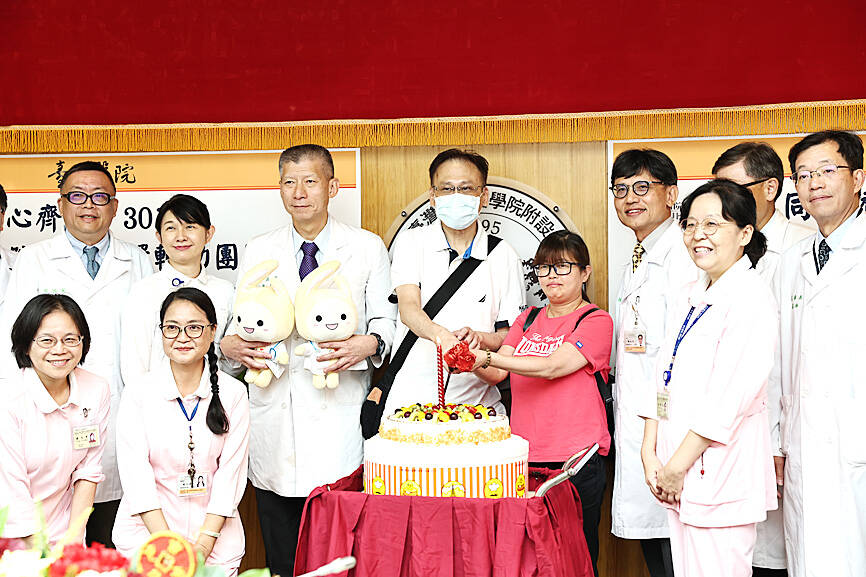National Taiwan University Hospital (NTUH) has performed its 100th keyhole heart surgery, which is a safer method to treat congenital heart disease and requires less recovery time by replacing a pulmonary valve with a self-expandable valve, the hospital said on Monday last week.
One out of every 3,000 to 4,000 people born in Taiwan have tetralogy of fallot (TOF), a congenital heart defect made up of four abnormalities of the heart and its vessels, Wang Jou-kou (王主科), a clinical professor at the College of Medicine at National Taiwan University, told a news conference.
The abnormalities include pulmonary stenosis, a narrowing of the pulmonary valve and main pulmonary artery, and ventricular hypertrophy, a condition in which the muscular wall of the right ventricle is thicker than normal, according to the US Centers for Disease Control and Prevention.

Photo: CNA
After undergoing surgeries during childhood to correct the abnormalities, about 30 percent of those with TOF develop pulmonary valve regurgitation when they reach adulthood, in which the pulmonary valve fails to close completely and allows blood to leak back into the heart, Wang said.
As a result of pulmonary valve regurgitation, the right ventricle also gradually enlarges, eventually requiring a valve replacement, he said.
Surgical pulmonary valve replacement is the traditional cardiac surgery to replace the pulmonary valve, which typically requires seven to 10 days of recovery, NTUH Department of Pediatrics deputy chairman Lin Ming-tai (林銘泰) said.
By comparison, transcatheter pulmonary valve replacement (TPVR), a less-invasive alternative, is less risky and reduces the recovery time to just one day, Lin said.
Featuring a self-expandable valve delivered to the heart through a small incision in the lower body, TPVR has been available to NTUH patients needing pulmonary valve replacement since 2015 and has been covered by National Health Insurance since Dec. 1, 2021, the NTUH team said.
As of Monday last week, the NTUH team, which was designated in 2021 as Taiwan’s sole guidance team for the TPVR procedure, has performed 102 of the surgeries, 100 of which were successful, Lin said.
In the 100th case, a 28-year-old woman with TOF surnamed Chang (張), shared her experience before undergoing TPVR last month.
She said she would get out of breath easily just from walking and felt fatigued all the time.
“My life now is completely normal,” Chang said after the keyhole surgery, adding that she can climb stairs without feeling tired.
With their extensive experience in performing TPVR, some NTUH doctors have been invited to the Philippines to treat patients with pulmonary valve issues, while hospitals in Indonesia and Vietnam have sent doctors to NTUH for training, Lin said.
Indonesian and Vietnamese doctors “observed how smoothly we are able to replace the valves and realized that their patients could also benefit from this treatment,” he said.
The NTUH team would have an opportunity to perform TPVR in Vietnam and Indonesia in the near future, he added.

Chinese Nationalist Party (KMT) Chairman Eric Chu (朱立倫), spokeswoman Yang Chih-yu (楊智伃) and Legislator Hsieh Lung-chieh (謝龍介) would be summoned by police for questioning for leading an illegal assembly on Thursday evening last week, Minister of the Interior Liu Shyh-fang (劉世芳) said today. The three KMT officials led an assembly outside the Taipei City Prosecutors’ Office, a restricted area where public assembly is not allowed, protesting the questioning of several KMT staff and searches of KMT headquarters and offices in a recall petition forgery case. Chu, Yang and Hsieh are all suspected of contravening the Assembly and Parade Act (集會遊行法) by holding

PRAISE: Japanese visitor Takashi Kubota said the Taiwanese temple architecture images showcased in the AI Art Gallery were the most impressive displays he saw Taiwan does not have an official pavilion at the World Expo in Osaka, Japan, because of its diplomatic predicament, but the government-backed Tech World pavilion is drawing interest with its unique recreations of works by Taiwanese artists. The pavilion features an artificial intelligence (AI)-based art gallery showcasing works of famous Taiwanese artists from the Japanese colonial period using innovative technologies. Among its main simulated displays are Eastern gouache paintings by Chen Chin (陳進), Lin Yu-shan (林玉山) and Kuo Hsueh-hu (郭雪湖), who were the three young Taiwanese painters selected for the East Asian Painting exhibition in 1927. Gouache is a water-based

Taiwan would welcome the return of Honduras as a diplomatic ally if its next president decides to make such a move, Minister of Foreign Affairs Lin Chia-lung (林佳龍) said yesterday. “Of course, we would welcome Honduras if they want to restore diplomatic ties with Taiwan after their elections,” Lin said at a meeting of the legislature’s Foreign Affairs and National Defense Committee, when asked to comment on statements made by two of the three Honduran presidential candidates during the presidential campaign in the Central American country. Taiwan is paying close attention to the region as a whole in the wake of a

OFF-TARGET: More than 30,000 participants were expected to take part in the Games next month, but only 6,550 foreign and 19,400 Taiwanese athletes have registered Taipei city councilors yesterday blasted the organizers of next month’s World Masters Games over sudden timetable and venue changes, which they said have caused thousands of participants to back out of the international sporting event, among other organizational issues. They also cited visa delays and political interference by China as reasons many foreign athletes are requesting refunds for the event, to be held from May 17 to 30. Jointly organized by the Taipei and New Taipei City governments, the games have been rocked by numerous controversies since preparations began in 2020. Taipei City Councilor Lin Yen-feng (林延鳳) said yesterday that new measures by